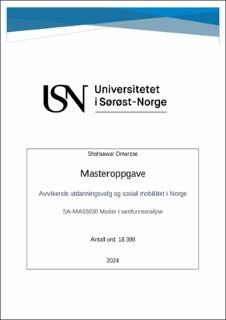Avvikende utdanningsvalg og sosial mobilitet i Norge
Master thesis
Permanent lenke
https://hdl.handle.net/11250/3121674Utgivelsesdato
2024Metadata
Vis full innførselSamlinger
Sammendrag
Bakgrunn: Norge er et land som gir innbyggerne gode forutsetninger til mobilitet. For å oppnå dette er utdanning en viktig faktor. Reproduksjonsteoretikerne mener at utdanning er en av kapitalformene som går i arv. Hvor høyt utdannede foreldres kapital, er med på å produsere høyt utdannede individer. Mens foreldre med lite utdanning, har ikke den samme arven som kan bidra til at deres barn sikter på utdanning.
Hensikt: Oppgavens hensikt er å hente informasjon fra informanter som har «gått mot strømmen». De har tatt utdanningsvalg som ikke samsvarer med reproduksjonsteoretikerne, og som vil forårsake endringer i deres sosiale mobilitet. Disse informantene kan bidra med dybde informasjon som kan belyse deres valg.
Metode: Oppgaven baserer seg på kvalitativ metode, hvor datainnsamlingen ble gjennomført ved hjelp av semistrukturerte intervjuer med fire informanter, som alle har tatt avvikende utdanninger i forhold til sine foreldre.
Resultater: Oppgaven viser at utdanning er en viktig faktor for å kunne klarte i mobilitetsstigen. Informantene har tatt bevisste valg og har hatt god kjennskap til sin egen situasjon, og hvordan de skal navigere i utdanningslandskapet. Det er i tillegg funn som antyder at avvikende utdanning kan være positivt for individer, for å kunne ha en følelse av selvrealisering og frigjøring fra tradisjonelle normer.
Konklusjon: Oppgaven viser utdanning kan brukes som en indikator på å måle mobilitet. Det er mange faktorer som avgjør på hvorfor individer velger å ta avvikende utdanning i forhold til sine foreldre. Det kan være faktorer de rår over, men det kan også oppstå situasjoner hvor individene må ta et valg som de må bære konsekvensene selv. I denne oppgaven fortalte informantene, at de kjente hva utfallet av deres valg av utdanning vil være.
Nøkkelord: Mobilitet, reproduksjon, utdanning, oppadgående, nedadgående, økonomi, sosial, kultur. Background: Norway is a country that provides its residents with favorable conditions for mobility. To achieve this, education is a crucial factor. Reproduction theorists argue that education is one of the forms of capital that is inherited. The capital of highly educated parents is instrumental in producing individuals with high levels of education. In contrast, parents with lower levels of education do not have the same inheritance that can contribute to their children aspiring to pursue education.
Purpose: The purpose of the task is to gather information from informants who have "gone against the grain." They have made educational choices that do not align with reproduction theorists' expectations and are likely to bring about changes in their social mobility. These informants can provide in-depth information that sheds light on the reasons behind their choices.
Method: The thesis is based on a qualitative methodology, with data collection conducted through semi-structured interviews involving four informants, all of whom have pursued divergent educational paths compared to their parents.
Results: The thesis demonstrates that education is a crucial factor for success in the mobility ladder. The informants have made conscious choices and possess a good understanding of their own situations, as well as how to navigate the educational landscape. Additionally, there are findings that suggest pursuing non-conventional education paths can be positive for individuals, fostering a sense of self-realization and liberation from traditional norms.
Conclusion: The thesis demonstrates that education can be used as an indicator to measure mobility. There are many factors that determine why individuals choose to pursue education paths that deviate from those of their parents. These factors may be within their control, but there are also situations where individuals must make choices and bear the consequences themselves. In this thesis, the informants shared that they were aware of the outcomes of their choices regarding their educational paths.
Keywords: Mobility, reproduction, education, upward, downward, economy, social, culture.
